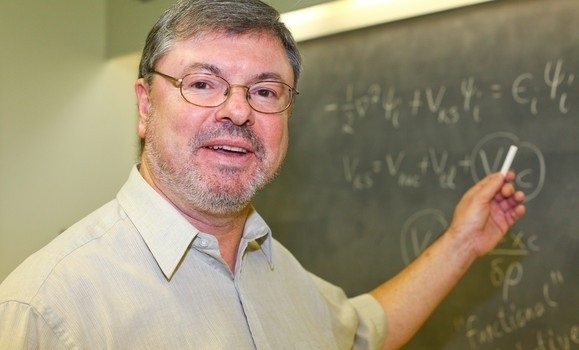You might not recognize him on the street, but in some circles Dal Chemistry Professor Axel Becke is quite famous.
Dr. Becke, Killam Chair in Computational Chemistry, is one of the most cited physical scientists in the world. His research has changed the way computational chemists work and paved the way for advancements in fields like pharmaceuticals. His work is so integral to day-to-day research in applied physics and chemistry, it receives about four times as many academic citations per year as most highly respected scientists receive over their entire career.
Dr. Becke’s work has two qualities that make it such a citation sensation: it’s foundational and innovative. Dr. Becke develops theories and writes computer codes that allow scientists to model electronic structure: the movement of electrons in atoms, molecules, and materials. His approaches make the modeling process faster so that larger structures can be modeled and more complex research can be done.
A paradigm shift
In the early 1980s, things moved a lot slower than they do now. IBMs were running MS-DOS, Mario was just that little guy trying to dodge barrels in Donkey Kong, and applied physicists and chemists were using cumbersome “wavefunction” methods to calculate the energies of atoms and molecules. All of this was about to change.
The problem with wavefunction methods of computing electronic structure is the time it took to do calculations. Because of this, only very small structures — up to about 12 atoms — could be accurately modeled.
At this time, Dr. Becke was among the theoreticians developing a new approach to the electronic structure problem called Density Functional Theory (DFT). This theory allows for calculations to be done in a fraction of the time, with the same or even greater accuracy.
“The goal is to make things as fast as we can while maintaining accuracy,” says Dr. Becke. “We are now working at speeds that can simulate biology, which is important because biological reactions involve an awful lot of atoms.”
The increased speed means that systems containing hundreds of atoms can now be modeled in reasonable time, a number that allows for research into enzymatic reactions, protein structures, DNA, etc. This has huge implications for developing new medications, as it allows scientists to predict the nature of drug interactions in the human body. Increased computational capability also allows physicists and chemists to study new materials and functionalized surfaces.
Big citations
Now Dr. Becke’s research is integrated into every major commercial computational chemistry software package available. These packages are purchased by research groups and institutions, and used by applied scientists to do their modeling.
Consequently, he gets cited in academic papers — a lot. Between 1981 and 2010, Becke was the third most cited physicist in the world with 62,581 citations, and one of only three with more than 60,000 citations. Over the course of his career, he has been cited over 87,800 times so far, and authored the second and third most cited physics papers ever.
Why is Dr. Becke’s impressive citation rate important? “Research is expensive, and in the academic world, research groups and departments are often judged by the amount of funding they generate,” Dr. Becke explains. “My high citation rate means that I am more successful than many scientists at getting funding — and that’s key to a good research program.”
For his efforts, Dr. Becke has received a number of awards and prizes, including being named a Fellow of the Royal Society of Canada and the Royal Society of England. Adding to the collection, in March he will be presented with the Theoretical Chemistry Award of the American Chemical Society, the highest award in the U.S. for theoretical chemistry.

